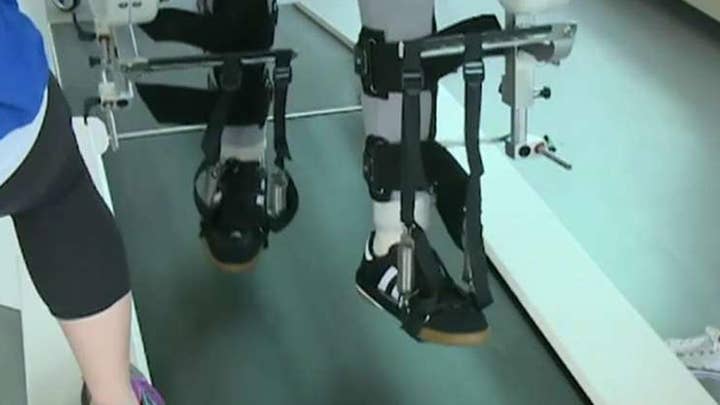'Polio-like' illness probed by CDC: Should you be concerned?
Dr. Marc Siegel explains the condition and what parents should know.
The mysterious polio-resembling illness that sickened hundreds of children last year may have been caused by a viral infection, according to a new study.
The rare illness, called acute flaccid myelitis (AFM), typically starts out with coldlike symptoms but quickly progresses, leading to limb weakness and paralysis.
AFM primarily impacts the central nervous system, “specifically the area of the spinal cord called gray matter, which causes the muscles and reflexes in the body to become weak,” according to the Centers for Disease Control and Prevention, which confirmed 236 cases in 2018.
CASES OF ‘POLIO-LIKE’ ILLNESS THAT’S PARALYZING CHILDREN APPEARS TO HAVE ‘PEAKED,’ CDC SAYS
The CDC had long suspected viruses – namely certain enteroviruses, or “a group of viruses that cause a number of infectious illnesses which are usually mild,” according to the European Centre for Disease Prevention and Control – could be behind AFM. But the culprit germ has been frustratingly elusive, making confirmation difficult. Other researchers have hypothesized AFM is an autoimmune disorder.
But in a new study published Monday in the journal Nature Medicine, researchers “detected the immunological remnants of a common seasonal virus in spinal fluid from dozens of patients diagnosed with acute flaccid myelitis,” according to a news release from the University of California, San Francisco. A research team from the university led the study.
The findings, according to the release, “provide the clearest evidence to date that AFM is caused by an enterovirus (EV) that invades and impairs the central nervous system.”
For the study, researchers checked patients' spinal fluid for signs the immune system had fought an invading virus. The results showed children who got sick harbored antibodies that target enteroviruses.
"This is circumstantial evidence that this is what's going on, but it's a powerful piece of circumstantial evidence," Dr. Michael Wilson of the University of California, who helped lead the research, told the Associated Press.
For the study, researchers customized a Harvard-developed tool to search for evidence of hundreds of viruses simultaneously — including herpes, measles, chickenpox, Zika and other enteroviruses. The researchers found antibodies for the enterovirus strains D86 and A71 in the majority of patients studied.
“Antibodies against enterovirus were found in the spinal fluid of nearly 70 percent of AFM patients; less than 7 percent of non-AFM patients tested positive for these antibodies,” per the release. “Furthermore, because spinal fluid from AFM patients did not contain antibodies against any other virus, every other known virus could be eliminated as a possible culprit.”
'POLIO-LIKE' ILLNESS CASES INVESTIGATED BY CDC: SHOULD YOU BE CONCERNED?
Still, more research is needed to understand why only a tiny fraction of those infected develop the ailment. It’s also not clear why only children are affected.
There have been 22 confirmed cases of AFM in 2019. But doctors are preparing for potential spike next year, as the CDC says AFM cases have increased every two years since 2014.
“We’re all holding our breath for 2020,” Dr. Ryan Schubert, a clinical fellow in the university's Department of Neurology and lead author of the study, said in a statement.
The Associated Press contributed to this report.









































